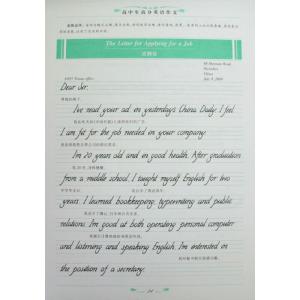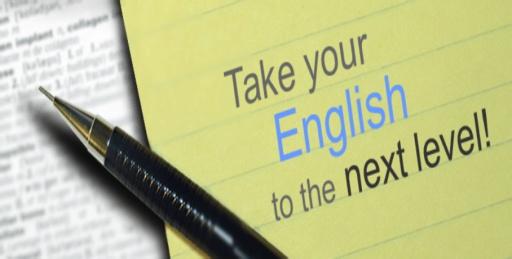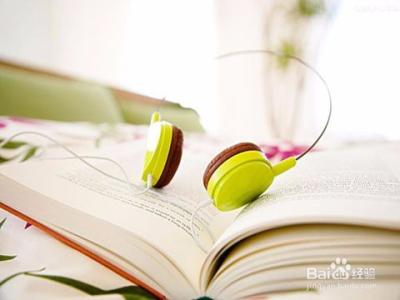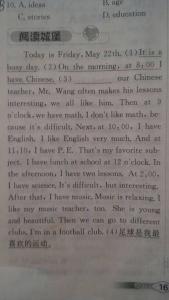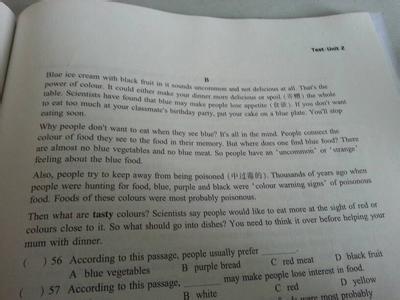随着我国经济发展和开放程度的加深,我国参与国际经济活动越来越频繁,英语作为国际上的通用语言与我们的生活越来越密切。下面是小编带来的英语口语测试阅读文章材料,欢迎阅读!
英语口语测试阅读文章材料1Unit 5 Nightlife
夜 生 活
Part One: Expressions
1. Do you have any tickets for the show tonight?
今晚的演出还有票卖吗?
2. I’m sorry. It’s sold out.
对不起,都卖光了。
3. What time does it start?
什么时候开始?
4. Where is section A located?
A区在哪里?
5. What do you recommend?
你有什么推荐?
6. I’ll have a tall expresso with soy milk and cinnamon sprinkles, please.
我要一个大号浓咖啡,加豆奶和肉桂。
7. Do you serve any draft beer?
有生啤卖吗?
8. I’d like to make a reservation for two at eight o’clock.
我预订一张八点钟的两人台。
9. Can I take your order?
可以点菜了吗?
10. What are the odds?
(成功的)几率是多少?
Part Two: Dialogues
1.Tickets 买票
A: Hi, do you have any tickets for the show tonight?
B: Sorry, it’s all sold out.
A: Well, do you have any for tomorrow?
B: We have tickets for the matinee. It starts at 3p.m.
A: Ok. I’ll take it.
B: Where would you like to sit?
A: Do you have anything in the middle section? I want a good view, but sitting too close hurts my eyes.
B: Certainly.
A: 你好,今晚的演出还有票卖吗?
B: 对不起,卖完了。
A: 那么,明天的呢?
B: 我们有日场的票卖,下午3点钟开始。
A: 好的,我买(日场)。
B: 您想坐在什么地方?
A: 有中间的座位吗?我想视觉效果好一点,但坐得太近又伤眼睛。
B: 有的。
2. Order 点菜
A: Are you ready to order?
B: Yes, I’ll have the Texas chili burger.
A: Would you like fries with that?
B: A large, with tons of ketchup.
A: And to drink?
B: I’ll have a diet coke, please.
A: Is this dine-in or take-out?
B: Take-out, please.
A: 您可以点菜了吗?
B: 可以了。我要点德州辣汉堡。
A: 要薯片吗?
B: 大号薯片,多加点番茄酱。
A: 喝什么饮料呢?
B: 要一个低糖可乐。
A: 在这里吃还是打包带走?
B: 打包带走。
3.Gambling 赌球
A: I can’t believe it!
B: What’s wrong? That was a great goal.
A: Yes, but I bet $200 dollars on the Cougars!
B: Looks like you’re going to lose out on this game then.
A: I can’t believe it! I thought the Cougars were going to win for sure.
B: What were the odds?
A: 20 to 1, in favour of the Cougars!
B: Too bad.
A: 我简直无法相信!
B: 怎么了?这可是个好球。
A: 不错,可是我可花了200元赌美洲豹队赢。
B: 那这场比赛你可要输了。
A: 我真不能相信。我开始可是认为美洲豹肯定赢的。
B: 赌了多少钱?
A: 一注20元,支持美洲豹队。
B: 真够惨的。
Part Three: Substitutions
1. A: Do you have any tickets for the (show/ game/ concert) tonight?
B: Sorry, we’re sold out.
今晚的(演出/比赛/音乐会)还有票卖吗?
对不起,卖完了。
2. A: What time (does it start/ is intermission/ does it finish)?
B: At eight o’clock.
什么时候(开始/中场休息/结束)?
8点钟。
3. A: Where is (section B/ seat 42F/ the exit) located?
B: This way, please.
(B区/42F座/出口)在哪里?
请这边走。
4. A: What can I get for you?
B: Do you serve any (draft beer/ snacks/ hot food)?
您要买点什么?
有(生啤/零食/热的食物)卖吗?
5. A: What (wine/ pasta/ dessert) do you recommend?
B: This one is excellent.
你推荐什么(酒/意大利面/甜食)?
这种不错。
6. A: Can I take your order?
B: I’ll have a (roast beef sandwich on rye/ lamb / hamburger, well-done), please.
可以点菜了吗?
我要一个(黑麦烤牛肉三明治/羊肉/全熟的汉堡)。
7. A: Do you have any seats left?
B: I’m sorry. We (are sold out/ only have stand-by tickets/ only have balcony seats).
还有座位吗?
对不起。(票卖完了/只有站票了/楼坐的票了)。
8. A: Smith Steakhouse. Can I help you?
B: Yes, I’d like to make a reservation for (two at eight o’clock/ six at seven thirty/ three at a quarter to nine).
史密斯牛排店。能为您效劳吗?
好的。我想预订一张(八点钟的两人台/ 7点30的六人台/ 8点45的三人台)。
9. A: Can I see your (ticket/ I.D.*/ driver’s license), please?
B: Here you are.
可以看一下您的(票/身份证/驾驶执照)吗?
给您。
10. A: Where would you prefer to sit?
B: I’d like to sit (in the front/ by the window/ in the smoking section).
您想坐哪儿?
我想坐在(前排/靠窗/吸烟区)。
Part Four: Monologue
“Unlike in other parts of the world, it is both customary and expected for customers to tip the servers when going out to restaurants, bars, and coffee shops in America. At most places, servers don’t get paid usual wages. Rather, they take home their daily tips as a salary. The average tip that each customer must pay is about 20% of the bill, depending on the service and on the quality of the restaurant. If paying with a credit card, the customer writes the tip in the space below the cost of the meal and then adds it into the total payment. If paying in cash, the customer first pays the server the price of the meal and then leaves the tip on the table before exiting the restaurant.”
与世界其他国家不同,在美国,当外出就餐、上酒吧、去咖啡馆的时候,顾客最好能给服务生一些小费,这也是一种惯例。在很多地方,服务生并不拿一般意义上的工资,相反,他们拿回家的薪金往往是他们的日常小费所得。每位顾客所给的小费约是账单的20%的数额,这还视服务质量和饭店档次而定。如果是以信用卡付账,顾客会把小费数额写在账单下方,将其计入总花费里。如果是以现金付款的话,顾客先付餐费,然后在离开饭店之前,把小费留在桌上(给服务生)。
英语口语测试阅读文章材料2Unit 4 Traveling
旅 游
Part One: Expressions
1. Where’s the nearest tourist information center?
最近的游客咨询中心在哪里?
2. What’s the best way to get to the museum?
去博物馆走哪条路最好?
3. What time does it close?
什么时候关门?
4. Can you recommend a good hotel?
你有没有好的旅馆可以推荐?
5. I’d like a window seat, please.
我想要一个靠窗的座位。
6. Is the flight leaving on time?
航班准点起飞吗?
7. What’s the gate number?
几号门?
8. What time are we boarding?
我们什么时候登机(船)?
9. Is there an entrance fee?
入口处要收费吗?
10. Do you have any information about the river cruise?
关于坐船游览是怎么样的?
Part Two: Dialogues
1. Tourist Information 游客信息(咨询)
A: Excuse me.
B: Yes?
A: Do you have any information about the city sights?
B: Sure. There’s a lot here in this pamphlet.
A: Thank you. And what’s the best way to get downtown?
B: Take the subway. It’s $1.50 per ride. You can buy a metro card at the station.
A: You’ve been very helpful.
B: My pleasure.
A: 打扰一下。
B: 什么事?
A: 关于市区观光有没有信息可以提供?
B: 当然有。这本小册子里面有很多介绍。
A: 谢谢。去商业中心怎么走最好?
B: 坐地铁。单程是1.5美元。你可以在地铁站买到地铁卡。
A: 你帮了我的大忙。
B: 很乐意为你服务。
2. Traveling by Plane飞机旅行
A: Can I see your ticket please?
B: Here you are.
A: Ok, Mr. Smith. Do you have any bags to check?
B: Just this one.
A: And would you prefer a window seat or an aisle seat?
B: Aisle, please.
A: Boarding time is 10:20am.
B: What’s the gate number?
A: Gate 29C. Have a nice flight.
A: 您的票呢?
B: 给你。
A: 哦,史密斯先生,你有什么行李要托运的吗?
B: 就这一个。
A: 你想要一个靠窗的位子,还是靠过道的。
B: 靠过道的。
A: 登机时间是上午10点20分。
B: 在几号门?
A: 29C。祝您航程愉快。
3. Hotels 酒店
A: Can I help you?
B: Yes, do you have any rooms available?
A: A single?
B: No. I need a double and three triples. My family is waiting for me in the car.
A: Please fill out this form, sir.
B: Ok…Here you are.
A: Here are your keys. Check out time is noon.
B: Is breakfast included?
A: No.
A: 我能为您效劳吗?
B: 是的,你们还有房间吗?
A: 单人间吗?
B: 不是,我需要一个双人间和三个三人间。我家人在车里等我。
A: 请填一下这张表,先生。
B: 好的。给你。
A: 这是钥匙。退房时间是中午。
B: 包早餐吗?
A: 不包括在内。
Part Three: Substitutions
1. A: Do you have any information about (city sights/ transportation/ hotel rooms)?
B: Sure, it’s all in this pamphlet.
关于(市区观光/交通方式/酒店房间)你有什么信息提供吗?
当然,这本小册子里都有。
2. A: Can you tell me the best way to get to (downtown/ the theater/ the river)?
B: Take bus No. 4.
请问去(商业中心/剧院/那条河)怎么走最好?
坐4路公共汽车。
3. A: You’ve been very (helpful/ kind/ considerate).
B: My pleasure.
你(帮了我的忙/真好/ 想得真周到)。
非常乐意。
4. A: Do you have any form of identification?
B: Here’s my (passport/ driver’s license/ member’s card).
你有什么证件吗?
这是我的(护照/驾驶执照/会员卡)。
5. A: Any seat preferences?
B: Yes, I’d like (a window/ a middle/ an aisle) seat, please.
你有什么座位偏好吗
有,我想坐(靠窗/中间/靠过道)的座位。
6. A: When do we (board/ depart/ arrive)?
B: At 6:49pm.
我们什么时候(登机(船)?/离开?/到达)?
下午6点49分。
7. A: Have a nice (flight/ trip/ time)!
B: See you!
祝你(航空旅程/旅途/玩得)愉快。
再见。
8. A: Do you have a (single/ double/ triple) room available?
B: For how many nights?
你们有一间(单人房/双人房/三人房)吗?
住几个晚上?
9. A: Is (breakfast/ tip/ laundry service) included?
B: No.
包括(早餐/小费/洗衣服务)吗?
不包括。
10. A: Any other questions?
B: When is (check-out time/ breakfast finished/ the karaoke room open)?
还有没有其他问题?
什么时候(退房/不再供应早餐/卡拉OK房开始)?
Part Four: Monologue
“Traveling involves so much stress! Preparation is especially hard - trying to arrange the transportation, accommodation, and time off from work. Packing isn’t easy. How can you possibly know everything you may or may not need in a place that’s largely unknown to you? Assuming you ever reach your destination, you have to communicate with people who often don’t speak your language and you have to navigate your way around an area you have no idea about. How are you supposed to relax under such conditions? And all that money you’re spending! For what? I don’t get it at all.”
--George Threadborne, disgruntled traveler
旅行的压力太大了。准备工作尤其艰难,要安排交通、食宿,还要告假。行李收拾也不容易。在一个你一无所知的地方,你怎么可能预料什么对你有用什么又对你没用?假设你到达你的目的地,你必须和那些通常不和你讲同一国语言的人交流。还要在一个你毫不熟悉的地方探路。在这样的情况下你怎么可能放松?还有,想想旅行要花的钱!这到底是为了什么?我可不知道。
英语口语测试阅读文章材料3Unit 6 Holidays
假 期
Part One: Expressions
1. What are you up to?
你去哪里?
2. I’m just going to take it easy.
我只想放松一下。
3. I have the day off.
我不用上班。
4. Do you have any plans?
你有何计划?
5. Can I check this book out?
这本书我可以借出吗?
6. Who is the author of that book?
那本书的作者是谁?
7. Do you have any books by this author?
你有没有这位作家写的书?
8. When is it due back?
什么时候归还?
9. It’s such an exquisite painting.
这幅画真是精品。
10. How much is it worth?
它值多少钱?
Part Two: Dialogues
1.Plans 安排
A: Hey, Ted. What are you up to this Friday?
B: Well, I have the day off from work.
A: That’s great! Do you have any plans?
B: Well, I’ve been working so hard lately, so I’ll probably just take it easy.
A: Sounds nice.
B: Yeah, I’ll probably just stay in and relax. Maybe watch a few movies.
A: Can I stop by?
B: Sure. Any time.
A: 嘿,特德。这个星期五你去哪里?
B: 哦,我不用上班。
A: 太棒了。有什么计划吗?
B: 哦,这段时间我一直拼命工作。我可能只想放松放松。
A: 不错嘛!
B: 是呀,我可能就呆在家里轻松一下。可能看几场电影。
A: 我顺道来玩一玩好吗?
B: 当然,随时欢迎。
2.Borrow books 借书
A: Can I help you?
B: Yes, I’m doing some research on Roman civilization. Do you have any books on the subject?
A: These books over here are about ancient history. They might be helpful.
B: Can I check this one out?
A: I’m sorry. It’s for reference only, so it must stay in the library. But you’re welcome to look through it.
B: Ok. And I’d like to check these books out.
A: All right. They’re due back next Wednesday.
B: Thanks for your help.
A: 我能为您效劳吗?
B: 我在做一些关于罗马文明方面的研究,这方面有没有什么书?
A: 这里的这些书是关于古代历史的。可能有些帮助。
B: 这本可以外借吗?
A: 对不起,这本只是参考书,不能外借。但是你可以查阅。
B: 好吧。我想借这些书。
A: 好的。归还期限是下个星期三。
B: 谢谢你的帮忙。
3.In the museum 在展览馆
A: Wow! I can’t believe I’m standing here!
B: What are you so excited about?
A: I’m standing in front of an exquisite work of art!
B: What’s the big deal? It’s just a picture of some woman.
A: I’ve seen it so many times in books, but I never imagined I’d get to see it in person.
B: There are tons of other paintings that I think are better.
A: Maybe so, but do you have any idea how much this one is worth?!
B: No, how much is it worth?
A: About 80 million dollars.
B: Whoah.
A:哇,我简直不能相信我站着这儿。
B: 你怎么如此兴奋。
A: 我可是站在一副精美的艺术作品前面。
B: 这又有什么了不起。只是某位女士的肖像画而已。
A: 我在书本上看到很多次。但没想到可以亲眼见到。
B: 我想比这好的不计其数。
A: 可能是的。但是你知道这幅画值多少钱吗?
B: 不知道,值多少钱?
A: 大概8千万元。
B: 哇。
Part Three: Substitutions Drills
1. A: What are you up to?
B: I’m (taking it easy/ relaxing/ staying in tonight).
你去哪里?
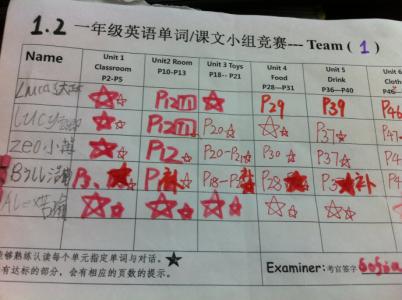
我去(放松一下/轻松一下/今晚呆在家里)。
2. A: Do you have any plans?
B: I’m going to (watch movies/ read a book/ wash my bicycle).
有什么计划吗?
我打算去(看电影/看本书/清洗我的自行车)。
3. A: Sounds (nice/ exciting/ thrilling).
B: You’re welcome to join me if you want.
听起来(不错/很刺激/惊险)。
如果你愿意欢迎你加入我们。
4. A: I’ve been so (busy/ stressed out/ overwhelmed) lately.
B: You should take it easy.
我近来(一直很忙/压力很大/负荷很大)。
你应该放松一些。
5. A: Can I check this (book/ encyclopedia/ audiotape) out?
B: I’m sorry. It’s for reference only.
这(本书/本百科全书/块录音磁带)我可以借出吗?
对不起,这是只供参考的书目。
6. A: When is this book due back?
B: It’s due back (next Tuesday/ a week from Friday/ in three days).
这本书归还期限是什么时候?
下星期二/星期五开始后的一个星期/三天以内。
7. A: Do you have any books on (cars/ fish/ European economic conditions)?
B: These might be helpful.
有没有关于(汽车/鱼类/欧洲经济状况)的书?
这些可能有些帮助。
8. A: I’m sorry, sir. No (eating/ drinking/ using mobile phones) in the library.
B: Please forgive me.
对不起,先生。图书馆内不准(吃东西/喝东西/使用手提电话)。
请原谅。
9. A: It’s such (a beautiful/ an exquisite/ a lifelike) statue.*
B: I agree.
这尊雕像真是(漂亮/精致/栩栩如生)。
是这样。
10. A: How much is it worth?
B: I’d guess around ($20,000/ $4,801,199/ $2.7 million).
它值多少钱?
我猜大概(2万元/4,801,199元/270万元左右)。
Part Four: Monologue
“Almost everyone knows the painting, Mona Lisa, but not everyone knows of its bizarre history. It was sold to the king of France, and later Napoleon hung it in his own bedroom. Then, in 1911, it was stolen from the Louvre by an Italian man. Apparently, he simply put the painting under his shoulder and walked out the front door. Museum attendants didn’t even notice the painting was missing until a day or so later. The Mona Lisa turned up after about a year and a half in the shop of an antique dealer in Italy. The man who had stolen the painting wanted it back in the artist’s home country and, after his mission accomplished, he was seen as a national hero by many. Italian authorities then returned it to the Louvre Museum, where it now hangs behind bullet proof glass.”
每个人都知道蒙娜·丽莎这幅画,可是并非人人了解她的离奇的历史。她早先是卖给了法国国王,随后拿破仑把她挂在自己的卧室里。之后,在1911年,她被一个意大利人从卢浮宫偷走。很明显,这个人只是把这幅画夹在自己的腋下从前门走出去。在画被偷走的一两天之后,卢浮宫的服务人员才发现画被盗。约一年半之后,蒙娜·丽莎出现在意大利的一家古董店里。当年偷了此画的人想让她重新回到画家的国家,任务完成之后,他也被很多人视为一个民族英雄。之后意大利当局把她归还给卢浮宫,现在这幅画正悬挂在宫内的防弹玻璃窗后面。
 爱华网
爱华网